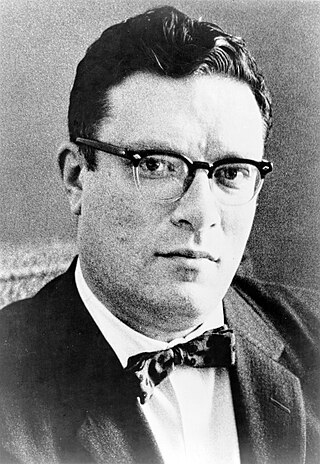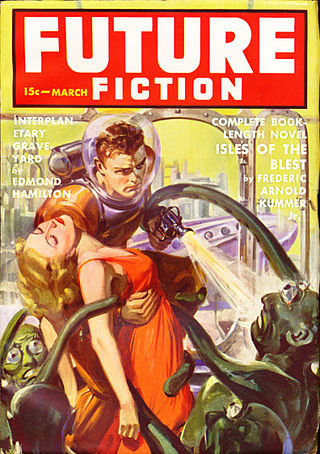
Isaac Asimov was an American writer and professor of biochemistry at Boston University. During his lifetime, Asimov was considered one of the "Big Three" science fiction writers, along with Robert A. Heinlein and Arthur C. Clarke. A prolific writer, he wrote or edited more than 500 books. He also wrote an estimated 90,000 letters and postcards. Best known for his hard science fiction, Asimov also wrote mysteries and fantasy, as well as popular science and other non-fiction.
The Galactic Empire series is a science fiction sequence of three of Isaac Asimov's earliest novels, and extended by one short story. They are connected by their early place in his published works and chronological placement within his overarching Foundation universe, set around the rise of Asimov's Galactic Empire, between the Robot and Foundation series to which they were linked in Asimov's later novels.

Gardner Raymond Dozois was an American science fiction author and editor. He was the founding editor of The Year's Best Science Fiction anthologies (1984–2018) and was editor of Asimov's Science Fiction (1986–2004), garnering multiple Hugo and Locus Awards for those works almost every year. He also won the Nebula Award for Best Short Story twice. He was inducted to the Science Fiction Hall of Fame on June 25, 2011.

Asimov's Science Fiction is an American science fiction magazine edited by Sheila Williams and published by Dell Magazines, which is owned by Penny Press. It was launched as a quarterly by Davis Publications in 1977, after obtaining Isaac Asimov's consent for the use of his name. It was originally titled Isaac Asimov's Science Fiction Magazine, and was quickly successful, reaching a circulation of over 100,000 within a year, and switching to monthly publication within a couple of years. George H. Scithers, the first editor, published many new writers who went on to be successful in the genre. Scithers favored traditional stories without sex or obscenity; along with frequent humorous stories, this gave Asimov's a reputation for printing juvenile fiction, despite its success. Asimov was not part of the editorial team, but wrote editorials for the magazine.

Drexel Jerome Lewis Bixby was an American short story writer and scriptwriter. He wrote the 1953 story It's a Good Life, which was included in The Science Fiction Hall of Fame.
This is a bibliography of the books written or edited by Isaac Asimov, arranged alphabetically. Asimov was a prolific author, and he engaged in many collaborations with other authors. This list may not yet be complete. The total number of books listed here is over 500. Asimov died in 1992 at age 72; a small number of his books were published posthumously.

"The Last Question" is a science fiction short story by American writer Isaac Asimov. It first appeared in the November 1956 issue of Science Fiction Quarterly and in the anthologies in the collections Nine Tomorrows (1959), The Best of Isaac Asimov (1973), Robot Dreams (1986), The Best Science Fiction of Isaac Asimov (1986), the retrospective Opus 100 (1969), and in Isaac Asimov: The Complete Stories, Vol. 1 (1990). While he also considered it one of his best works, "The Last Question" was Asimov's favorite short story of his own authorship, and is one of a loosely connected series of stories concerning a fictional computer called Multivac. Through successive generations, humanity questions Multivac on the subject of entropy.
George H. Scithers was an American science fiction fan, author and editor.

"Marooned off Vesta" is a science fiction short story by American writer Isaac Asimov. It was the third story he wrote, and the first to be published. Written in July 1938 when Asimov was 18, it was rejected by Astounding Science Fiction in August, then accepted in October by Amazing Stories, appearing in the March 1939 issue. Asimov first included it in his 1968 story collection Asimov's Mysteries, and subsequently in the 1973 collection The Best of Isaac Asimov.

"C-Chute" is a science fiction short story by American writer Isaac Asimov. It was first published in the October 1951 issue of Galaxy Magazine and later appeared in Asimov's collections Nightfall and Other Stories (1969) and The Best of Isaac Asimov (1973).

The Early Asimov or, Eleven Years of Trying is a 1972 collection of short stories by American writer Isaac Asimov. Each story is accompanied by commentary by the author, who gives details about his life and his literary achievements in the period in which he wrote the story, effectively amounting to a sort of autobiography for the years 1938 to 1949.

"Black Friar of the Flame" is a science fiction short story by American writer Isaac Asimov. It was first published in the Spring 1942 issue of Planet Stories and reprinted in the collection The Early Asimov (1972). "Black Friar of the Flame" was the thirteenth story written by Asimov, and was among his least favorite, though this was due more to the multiple rewrites and rejections the story suffered than to its admittedly modest intrinsic merits.

"Ring Around the Sun" is a science fiction short story by American writer Isaac Asimov. It was first published in the March 1940 issue of Future Fiction and reprinted in the 1972 collection The Early Asimov. "Ring Around the Sun" was the fifth story Asimov wrote, and also the fifth to be published.
"Insert Knob A in Hole B" is a science fiction short story by Isaac Asimov. The story was first published in the December 1957 issue of The Magazine of Fantasy and Science Fiction and reprinted in the 1969 collection Nightfall and Other Stories.

"The Borderland of Sol" is a science fiction novelette by American writer Larry Niven. It is the fifth in the Known Space series of stories about crashlander Beowulf Shaeffer.
"Half-Breed" is a science fiction short story by American writer Isaac Asimov. It was first published in the February 1940 issue of Astonishing Stories and reprinted in the 1972 collection The Early Asimov. It was the fifteenth story written by Asimov, and the fourth to be published. At 9000 words, it was his longest published story to date.
"Farewell to the Master" is a science fiction short story by American writer Harry Bates. It was first published in the October 1940 issue of Astounding Science Fiction on page 58. It provided the basis of the 1951 film The Day the Earth Stood Still and its 2008 remake. In 1973, the story was adapted by Marvel Comics for its Worlds Unknown series. According to Gizmodo, the 1973 adaptation was more faithful to the original story than was the 1951 film.
"The Ultimate Crime" is a short story by Isaac Asimov, dealing with a minor aspect of one of the Sherlock Holmes stories of Sir Arthur Conan Doyle. It is the 24th of Asimov's Black Widowers mystery stories, and it appeared in his anthology More Tales of the Black Widowers, which collects the second dozen stories of the series. It was written specially for that book. It subsequently appeared again in Sherlock Holmes Through Time and Space, an anthology of stories written by different authors and co-edited by Asimov, and Another Round at the Spaceport Bar.
In a writing career spanning 53 years (1939–1992), science fiction and popular science author Isaac Asimov (1920–1992) wrote and published 40 novels, 383 short stories, over 280 non-fiction books, and edited about 147 others.
Depending on the counting convention used, and including all titles, charts, and edited collections, there may be currently over 500 books in Isaac Asimov's bibliography—as well as his individual short stories, individual essays, and criticism. For his 100th, 200th, and 300th books, Asimov published Opus 100 (1969), Opus 200 (1979), and Opus 300 (1984), celebrating his writing.











